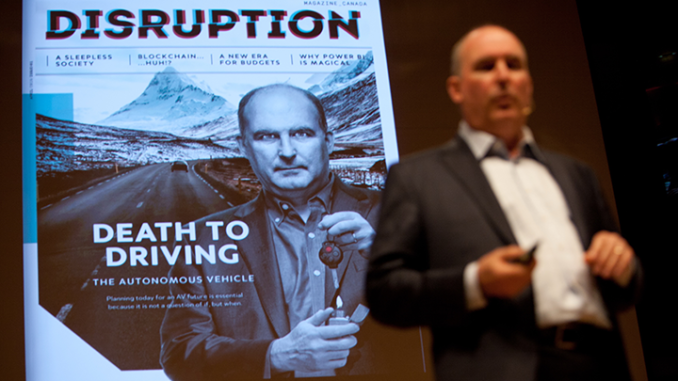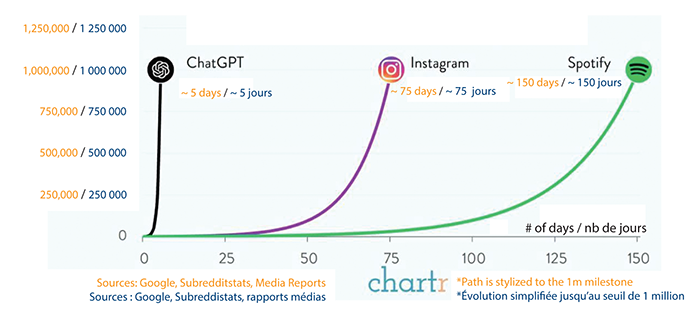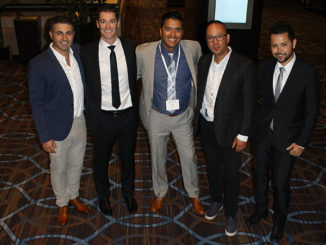
ChatGPT’s rapid ascent, amassing 100 million users in its first 60 days, mirrors the transformative impact of the web’s emergence in 1993, heralding a new era of AI-driven applications and reshaping industries.
By Jim Harris
On November 30, 2022, OpenAI launched ChatGPT. In the first five days, the new application attracted a million users. That was 30 times faster than Spotify, which took 150 days to reach a million users:
But that was just the start. ChatGPT went on to attract 100 million users in the first 60 days, making it the fastest-growing consumer app in history.
Stylized Path To 1 Million Users* (# of days from launch)

Mosaic Moment
This is a Mosaic moment. In 1993, Mosaic gave birth to the visual web. Mosaic was quickly followed by the launch of Netscape and then Microsoft’s Internet Explorer (IE). From that point forward, nothing was the same. The web transformed industries. It gave rise to new businesses. Amazon.com was born out of the web. Google was born out of the web.
Every day, there was some new application for the web, some new technology or enhancement. The progression was speedy and relentless. Companies and industries that ignored this revolution in 1993 were upended. The newspaper and magazine industry were devastated. The music industry was turned upside down.
Over the last 30 years, companies and industries that embraced the web have seen valuations grow into trillions of dollars: Amazon today is worth $1.4 trillion, and Alphabet (owner of Google) is worth $1.6 trillion.
Today it’s exactly the same with ChatGPT and generative AI.
Implications for Business Leaders
Marketing & Sales
I know one CEO who is saving two to three hours a day because he’s using ChatGPT to write the first draft of emails to prospects. He’s fed his standard marketing emails to ChatGPT so that it knows his writing style. And he lets it know what company he’s targeting, what industry it’s in, and who the CEO is. And then asks it to write the first draft of the email. Of course, he checks it, proofs it, and makes it his own.
Think about ChatGPT as a really smart intern who can write the first draft of something for you—but you would never simply publish what the intern gave you.
Summarization & RPFs
I was working with the executive team of a $100 million-a-year IT company. Currently, the firm takes about 1.5 days to respond to a government RFP. Their goal following our session to cut that time in half. It is possible to feed a document that’s hundreds of pages long, like an RFP, into ChatGPT and have it summarize the key points that a winning proposal will have to have.
Research
I have been talking about blockchain since 2016. But many people don’t understand the concept. So, you can have fun with ChatGPT and ask it to explain blockchain in the way a five-year-old can understand. I’m going to share my own personal answer.
Imagine Harry Potter has a magical diary. Whenever he writes anything in it, whatever he writes magically appears in all his friends’ diaries instantly. And once something has been written in any diary it can never be erased. These are the two principal characteristics of blockchain: distributed ledger on many servers and immutability—meaning no entry can ever be changed.
I regularly appear on Podcasts. Recently, I was a guest on Modern CTO, the #1 podcast for technology leaders. The host, Joel Beasley, used ChatGPT to research my background and suggest questions for the interview.
Deconstructing Jobs
A staggering 100,000 nurses quit the healthcare profession during the pandemic. Some got burned out from working double and triple shifts. Some got COVID and still have the impact of long COVID. Some, with the pressures, just decided to retire early. As a result, today, there is a huge shortage of nurses in the United States and Canada.
One American healthcare jurisdiction, Providence health, couldn’t attract enough nurses. So, they decided to do something about it. The administration studied what the work was that a traditional nurse does in their system: 30-40% of a nurse’s time was spent charting, entering data into a computer, and putting thermometers in patient’s mouths. (Now, they also put thermometers in other places, but we won’t talk about that here). So, all these tasks were re-assigned to admin people who don’t need years of medical training to do them, and presto! The nursing shortage went away!
So, this story isn’t just about technology. It’s about culture, it’s about process, it’s about training, it’s about questioning, “What is the best way to do something given the technology and tools at our disposal today?”
Customer Service
Imagine that you train a licensed version of ChatGPT on your industry’s general information and your company processes, policies, and marketing material, and you have a chatbot that’s working 24 by 365 to answer customer inquiries.
I don’t know if you saw Joaquin Phoenix’s movie Her, where he falls in love with an OS (operating system). Sound futuristic and far off? Think again. Caryn Marjorie is a Snapchat influencer with 1.8 million followers. Using a licensed version of ChatGPT her team fed 2,000 of her YouTube videos and material and created a “virtual girlfriend” that charges $1 a minute to talk to her. After the initial beta testing, it looks like the system will generate $5 million a year in billings.
One Warning
Don’t put any secret or proprietary data into ChatGPT because it will then be out in public and could be eventually seen by competitors.
Stakes are High; Progress Will Be Swift
In January 2023, Microsoft invested $10 billion to buy a third of OpenAI. Since then, Microsoft has committed to embed AI in all its products. And Microsoft’s market value has increased $750 billion. The investment has paid off 75 times over.
In February, Google rushed out its competitive product called Bard. On the first day of its launch, Bard gave an incorrect answer and that afternoon Alphabet (Google’s parent company) lost $100 billion on the stock market. The reason I point this out is 1) The stakes are very high. There are trillions of dollars of market capitalization that will shift as a result of AI and generative AI; and 2) because generative AI is so revolutionary it will get woven into business processes and our everyday lives—just like the web is integral to our lives today. ■
Jim Harris is a futurist and international bestselling author on disruptive innovation, tech, AI, and digital transformation. He’s been an investor in OpenExO since 2018. He speaks at 60+ events a year globally—in person and virtually. He also works with executive teams conducting strategic planning sessions. You can connect on Linkedin.com, follow him on Twitter at @JimHarris, or email him at jim@jimharris.com
Jim Harris delivered an exciting presentation at the TIAC annual conference in Whistler this past summer. Watch for a full schedule of innovative conference speakers scheduled for the 2024 conference, scheduled August 21-24, 2024 at the Delta St. John’s in St. John’s, Newfoundland, at tiac.ca/en/annual-conference/annual-conferences.



